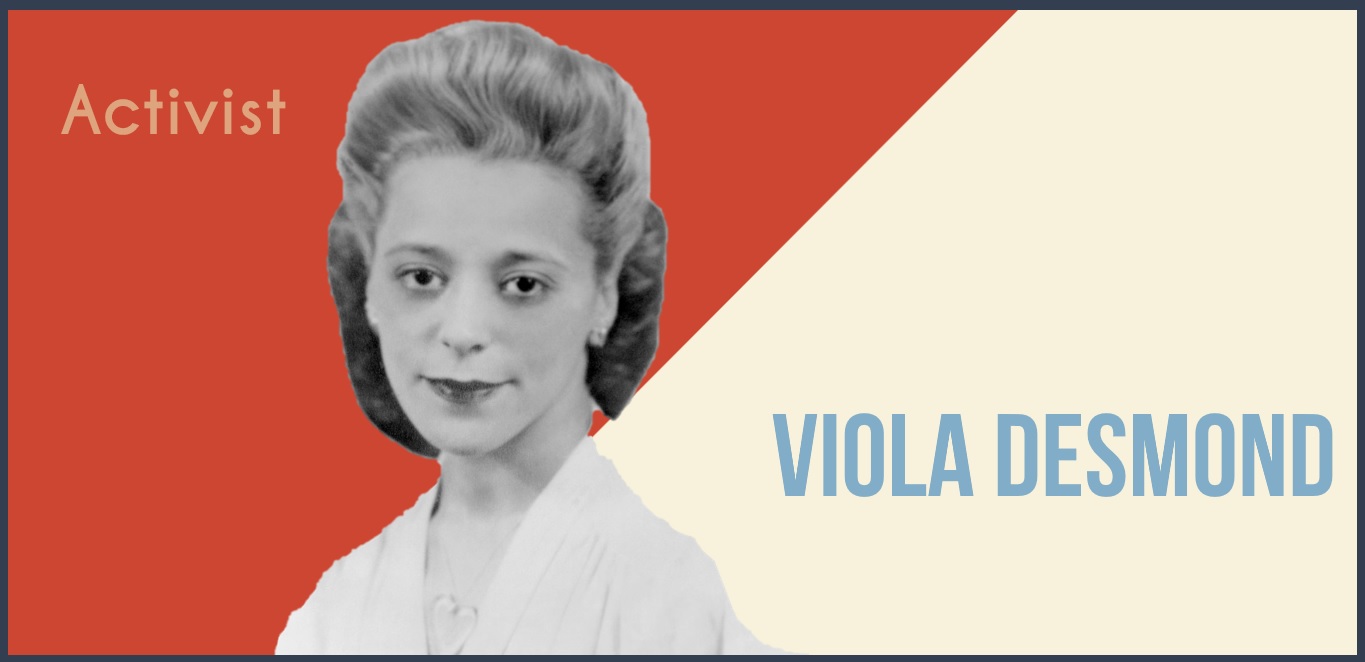Vocabulary
Before reading, translate these words.
Siblings
Address (verb)
Beautician
Broke down
Segregation
Reserved
Nearsighted
Refuse
Forcefully
Cent (money)
Incident
Charge (law)
Province
Tax evasion
Discrimination
Jim Crowe laws
Civil rights
Posthumous
Pardon
Acknowledge
Banknote
Biography
Early Life
Viola Desmond was born in Halifax, Nova Scotia on July 6th, 1914. Her mother was white and her father was black, which was rare in those times. She had nine siblings and raised by her grandparents. Her grandparents were active in the black community in Halifax. At the time, racism was an issue.
While growing up, Desmond recognized that there was a lack of hair and skin products for black women in Halifax. She wanted to address that issue. Unfortunately, she was not allowed to train to become a beautician because of her race. So, she had to leave Halifax and move to Montreal, Atlantic City, and New York to learn how to be a beautician. When she returned to Halifax, she opened her own hair salon called Vi’s Studio of Beauty Culture. Additionally, she opened the Desmond School of Beauty Culture to train black women in beauty care.
Roseland Theater
While on a trip to Sydney, Nova Scotia to sell her beauty products, her car broke down in New Glasgow. She had to wait there for a day until the car parts arrived. To pass the time, Desmond she went to the Roseland Theater to watch The Dark Mirror. There were no segregation laws for movie theaters in Nova Scotia and there weren’t any signs in the theater, but the main floor seats were reserved for white people. Black people were supposed to sit in the balcony.
Desmond was sold a ticket for the balcony, but she was unaware of the segregation. Since she was nearsighted, she sat on the main floor. She was asked to move but refused to move. At this point, she understood what was happening. She offered to exchange her ticket for the more expensive (1 cent difference) main floor ticket. The theater refused to sell her the ticket and Desmond refused to leave her seat. The theater forcefully removed her from the theater. She injured her hip in the event.
Desmond was arrested for this event and spent 12 hours in jail. She was also fined $20 for tax evasion. There was a 2 cent tax on the balcony seats and a 3 cent tax on the main floor seats. When she returned to Halifax, her husband told her to forget about the incident. Other members of the community told her to fight the charge in court.
Lawsuit
Desmond decided to fight the charge. Her story was covered by the first black-owned Nova Scotian newspaper, The Clarion. The story was front page news. She hired a lawyer named Frederick William Brissett. He never charged Desmond. Instead, the money she should have paid him went to the newly formed Nova Scotia Association for the Advancement of Coloured People (NSAACP).
The province argued that there was no racism involved and that it was a case of tax evasion. The judge in the case said that there was racial discrimination, but he couldn’t do anything about it because the case was only about tax evasion. He even compared the event to the Jim Crowe laws in the USA.
After the trial, Desmond divorced her husband. She moved her business to Montreal and enrolled in a business college. She moved to New York City. She died on February 7th, 1965.
Legacy
The event at the Roseland Theater is one of the most famous incidents of racial discrimination in Canadian history. It helped to start the civil rights movement in Canada.
In 2010, Desmond was granted the first posthumous pardon in Canadian history. She also received an apology from the Nova Scotian government for tax evasion. They also acknowledged that it was a case of racial discrimination. In 2017, Desmond became the first woman to appear alone on a banknote. Her picture is on the $10 Canadian banknote.
Questions
The questions will guide you through the reading and give a deeper understanding of the text
- Where was Viola Desmond born?
- Who was she raised by?
- Why did she want to become a beautician?
- Where did she travel to for school?
- Why did she go to the Roseland Theater?
- What kind of ticket did she buy?
- Where did she sit?
- Why was she arrested?
- Did the judge think there was racial discrimination?
- When did Desmond receive a pardon?
- Was it necessary for the province to apologize and pardon her?
- What banknote has a picture of Viola Desmond on it?
- If a law isn’t racist, can it still have racist outcomes?
- Viola Desmond has been compared to Rosa Parks. Is this a good comparison? How are they the same and how are they different?


